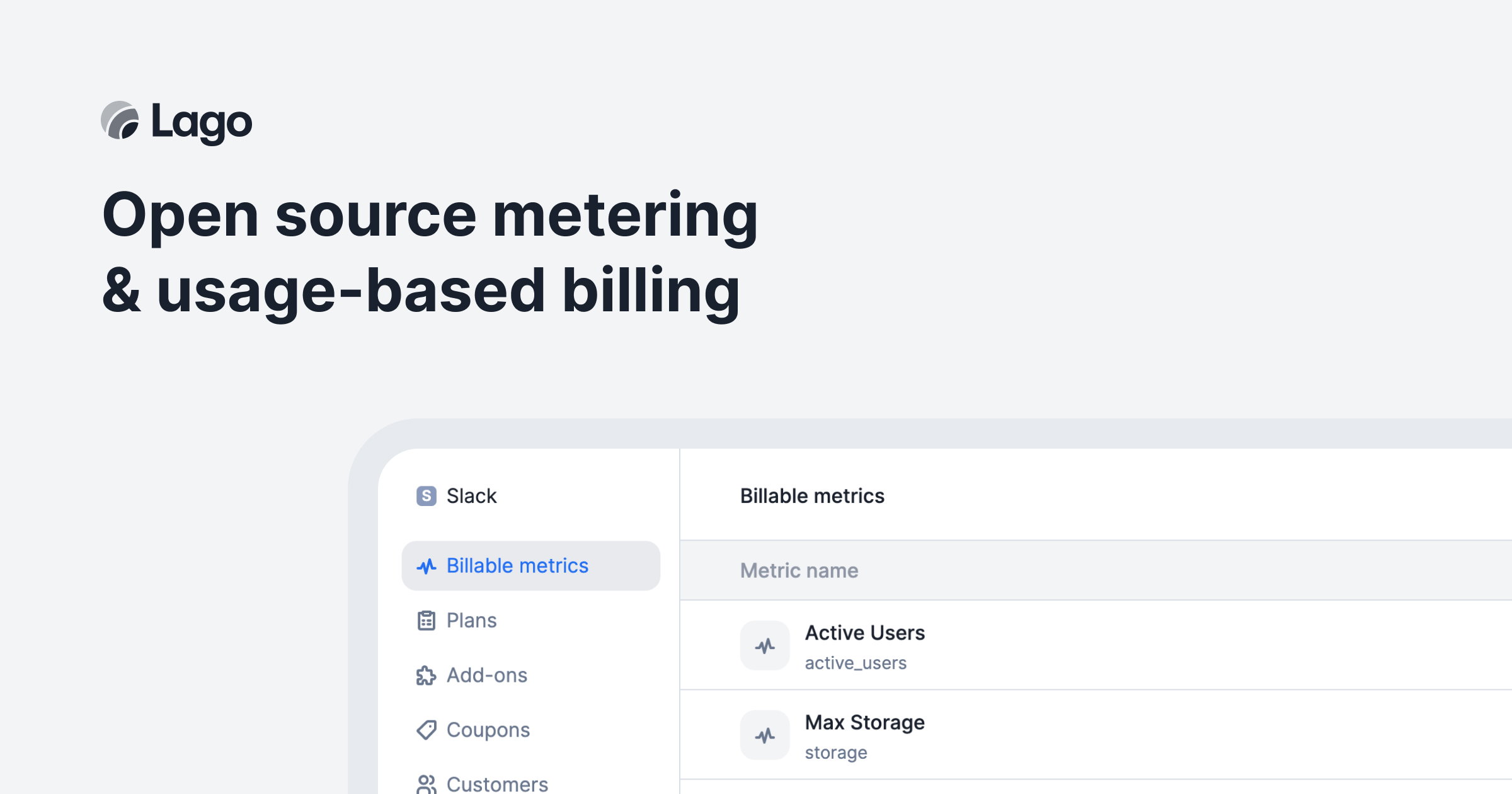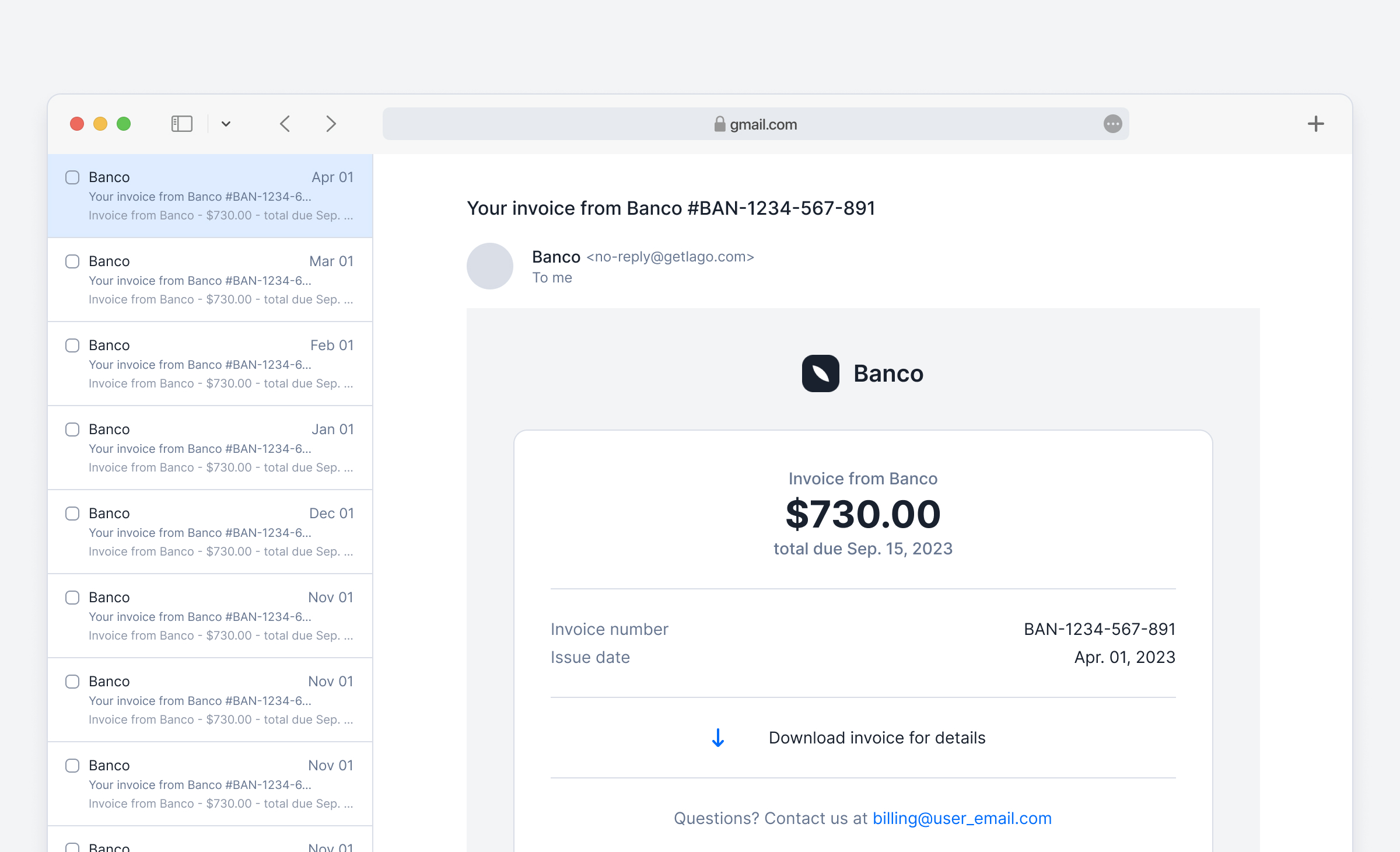
Deploy Lago [Updated Feb ’26] (Open-Source Billing & Metered Usage Platform)
Lago [Feb ’26] (GetLago) (Stripe Billing & Chargebee alternative) Self Host
Just deployed
Redis
Just deployed
/bitnami
Just deployed
/var/lib/postgresql/data
front
Just deployed

Deploy and Host Managed Lago Billing with one click on Railway
Lago (GetLago) is an open-source, event-based billing software available on GitHub, designed as a flexible and scalable alternative to Stripe Billing and other SaaS billing solutions. With Lago, businesses can implement metered billing software, hybrid pricing models, and full invoice automation, all while maintaining complete control over their billing data. The GetLago app can be self-hosted with Docker, giving startups and enterprises the power of a modern billing engine without being locked into vendor pricing.
About Hosting Lago on Railway (Self Hosting Lago Billing on Railway)
When you self host Lago billing, you keep all your financial data and customer billing information under your control. Unlike SaaS-only tools that store everything on external servers, hosting Lago on Railway ensures privacy, flexibility, and compliance.
Why Deploy Managed Lago Billing on Railway
Deploying a managed Lago service on Railway means you don’t have to worry about infrastructure setup, server scaling, or maintaining dependencies. With one click, you can get GetLago Docker running seamlessly.
Railway vs DigitalOcean:
With DigitalOcean, you would need to manually configure servers, handle updates, and secure databases for self-hosting Lago. Railway simplifies this by automating scaling and environment setup for Lago billing.
Railway vs Linode:
Linode requires ongoing manual patching and database configuration. Railway, on the other hand, provides a managed container approach, making it effortless to deploy Get Lago app without sysadmin overhead.
Railway vs Vultr:
Vultr requires detailed VM management for Lago. Railway removes the complexity, offering one-click deploy for Lago with managed Postgres and automated scaling.
Railway vs AWS Lightsail:
AWS Lightsail often introduces unnecessary complexity with networking and scaling. Railway enables fast Lago Stripe-like deployments with simple configuration.
Common Use Cases
Here are 5 common use cases for Lago billing:
- SaaS Subscription Billing – Create monthly, yearly, or custom billing cycles for SaaS products.
- Metered Usage Billing – Charge based on API calls, data usage, or seats with Lago’s metered billing software.
- Hybrid Pricing Models – Mix recurring subscriptions with usage-based pricing.
- Invoice Automation – Automatically generate and send invoices for all customer accounts.
- Stripe Alternative Billing – Use Lago Stripe integrations or replace Stripe Billing with a fully open-source solution.
Dependencies for Lago Billing hosted on Railway
To run Get Lago, you need:
- A Postgres database (for billing data)
- Redis (for caching and async jobs)
- Docker runtime (to package and deploy)
Deployment Dependencies for Managed Lago Service
When deploying Lago on Railway:
- Railway manages the Postgres instance
- Redis is automatically integrated
- Containers run securely with scaling
Implementation Details for Lago (Event-Based Billing)
Environment variables for self-hosting Lago typically include:
DATABASE_URL=${{Postgres.DATABASE_URL}}
REDIS_URL=${{Redis.REDIS_URL}}
LAGO_API_KEY=your-api-key
RAILWAY_PUBLIC_DOMAIN=${{RAILWAY_PUBLIC_DOMAIN}}
How does Lago compare against other billing platforms (Getlago Alternatives)
Lago vs Chargebee (Chargebee Alternative)
Chargebee is cloud-only with high pricing tiers, while Lago is free, self-hosted, and highly customizable. Chargebee is known for ease of use but can become expensive. Lago offers flexibility and control without recurring costs.
Lago vs Stripe Billing (Stripe Billing Alternative)
Stripe Billing is powerful but tied to Stripe’s payment ecosystem. Get Lago integrates with Stripe payments but is not limited to it, you can use any payment provider, making Lago more versatile.
Lago vs Recurly (Recurly Alternative)
Recurly is built for enterprises and comes with advanced dunning features but high fees. Lago provides similar capabilities for startups and SMEs while being fully open-source.
Lago vs Paddle (Paddle Alternative)
Paddle offers an all-in-one SaaS commerce platform including tax compliance and payments. Lago focuses on billing infrastructure, making it ideal if you want to integrate your own payment processor or compliance solutions.
Lago vs Maxio (Chargify + SaaSOptics) (Maxio Alternative)
Maxio targets finance teams with deep reporting and SaaS metrics, but it’s proprietary. Lago offers billing flexibility with the ability to build your own analytics on top.
Lago vs Zoho Subscriptions (Zoho Subscriptions Alternative)
Zoho Subscriptions is integrated into the Zoho suite, great if you already use Zoho apps. Lago, however, is API-first and integrates with any stack, which is better for developer-led SaaS companies.
Lago vs Zuora (Zuora Alternative)
Zuora is a heavyweight in enterprise billing with global compliance support. Lago is lighter, faster to deploy, and open-source, making it attractive for agile teams.
Lago vs Fastspring (Fastspring Alternative)
Fastspring handles payments, taxes, and global SaaS distribution. Lago lets you own the billing layer while connecting with your preferred tax and payment services.
Lago vs Zenskar (Zenskar Alternative)
Zenskar is a SaaS billing solution optimized for usage-based pricing. Lago offers the same flexibility but allows self-hosting on Docker, making it more customizable and affordable.
Lago vs Orb Billing (Orb Billing Alternative)
Orb is a modern, developer-focused billing SaaS. Lago is its open-source counterpart, giving you control, lower costs, and Railway-ready deployment.
Lago vs Open Source Alternatives (GetLago Competitors)
Other open-source billing projects exist, but Lago stands out with active contributors, robust documentation, and production-grade features like invoicing, hybrid billing, and credit systems. Most smaller projects lack long-term support and ecosystem maturity.
Lago vs In-House Billing Systems
Some companies build custom billing systems, but maintaining them is time-consuming and error-prone. Lago saves engineering time by offering a ready-made, event-driven architecture while still being customizable.

How to use Lago?
- Deploy Lago on Railway with one click.
- Set up your pricing models in the Lago dashboard.
- Connect your payment provider (Stripe, Adyen, PayPal, etc.).
- Start sending usage events via the Lago API.
- Lago automatically calculates charges, generates invoices, and tracks balances.
How to self host Lago on other VPS?
Clone the Repository
git clone https://github.com/getlago/lago.git
cd lago
Install Dependencies
Ensure Docker, Postgres, and Redis are installed.
Configure Environment Variables
DATABASE_URL=postgres://user:password@localhost:5432/lago
REDIS_URL=redis://localhost:6379
Start Lago with Docker Compose
docker-compose up -d
Access the Lago Dashboard
Visit http://localhost:3000 or your VPS public IP.
With Railway, you can skip all of these steps and deploy Lago instantly.
Features of Lago Billing
- Usage Metering – Track API calls, data usage, or feature access.
- Flexible Price Plans – Create recurring, pay-as-you-go, or hybrid models.
- Coupons & Discounts – Offer promotions and discounts.
- Add-ons – Charge for one-time features instantly.
- Automated Invoicing – Generate and send invoices automatically.
- Prepaid Credits – Sell prepaid packages for recurring revenue.
Official Pricing of Lago
Lago itself is open-source and free to self-host. Managed Lago cloud (GetLago Cloud) may have pricing tiers depending on usage, but the self-hosted Lago software is free. Hosting costs depend on your platform.
Self Hosting Lago vs Lago Paid Plans
- Self-hosting gives you complete control, no vendor lock-in, and free usage.
- Paid Lago Cloud plans give you managed hosting, scaling, and support.
Monthly Cost of Self Hosting Lago on Railway
Self-hosting Lago on Railway usually costs $5–$10/month for the core app, plus extra for Postgres and Redis. Still, it’s far cheaper than SaaS billing tools.
FAQs
What is Lago Billing?
Lago is an open-source, event-based billing engine that helps SaaS companies manage subscriptions, usage-based pricing, and invoices.
How do I self host Lago Billing?
You can self-host Lago by deploying it on Railway with one click, or on any VPS using Docker, Postgres, and Redis.
Is Lago better than Stripe Billing?
Lago is not a payment processor like Stripe. Instead, it manages billing logic and invoices. You can still integrate Lago with Stripe payments for a full solution.
Does Lago support metered billing?
Yes, Lago is designed for metered billing software and event-based pricing.
Is Lago safe to use?
Yes, Lago is open-source with an active community. When self-hosted on Railway, your data stays under your control.
Does self hosting Lago remove restrictions?
Yes. Self-hosting Lago means no feature limits, no per-customer restrictions, and full flexibility.
How much does it cost to run Lago on Railway?
On average, around $5–$10/month depending on usage.
Can I run Lago with Docker?
Yes. The Get Lago Docker setup is the easiest way to deploy locally or on Railway.
Where can I find Lago’s source code?
You can find it on GetLago GitHub.
Template Content

